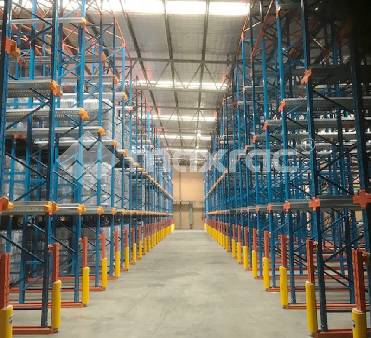In order to achieve the highest efficiency and storage capacity, Warehouse Shelves and goods must follow certain principles:
1. Large sales or promotional products should be placed on shelves near the exit or entrance of the warehouse
2. Goods for large sales or promotional items should be placed in the gold position in the middle of the gold shelf.
The reason why the shelves near the exit of the warehouse are not placed on high-volume products is because the goods in the middle of the shelves do not require the picker to bend over, which is conducive to fast picking and fast shipping. Products with low sales are placed at the bottom or top of the shelf.
However, in the specific implementation process, it needs to be dealt with according to the specific situation of the shelf. For example, the gold position of the gold shelf has been occupied by other products, then the promotional products must be placed on the secondary gold shelf. In addition, sellers need to decide who occupies the prime position of promotional products and long-term products based on their own circumstances. However, the general rule is the same: place large shipments and bulky goods close to the exit.

Warehouse Shelves
For the Warehouse Racking System, improving the space utilization rate and maximizing the storage space range is the most important issue. The greater the space utilization rate, the greater the economic benefit. Because the shelf is a shelf for storing goods, when designing the shelf, the length, width, and the distance between the shelf and the shelf should be designed according to the shape, size, weight and other data of the goods themselves. Usually they are against the wall. Single-row shelves should be placed on the shelves, and double-row shelves should not be placed against the wall.
In the design of warehouse shelf placement, we should not only pay attention to providing space utilization, but also not only consider how many shelves can be placed at most, because the higher the space utilization of the warehouse, the feasibility and convenience of actual operation will be improved. Lowering, for example, a Medium Duty Shelving placed against a wall is a manifestation of practical operational feasibility. If a double row is placed against one side of the wall, the warehouse shelves in the inner row will be inconvenient to store and store goods. If the warehouse shelves on the wall are placed in a single row, it will cause a waste of space. It is thought that each row of shelves has a distance, and the distance is generally set to 1 meter, so that it is convenient to access the goods.
In short, we must fully understand the warehouse environment such as warehouse area, type, passage, height, ground, fire protection facilities, etc.; related equipment: such as forklifts, stackers, elevators. Aisle required for forklift. Turn length etc. Follow the flow of goods to be smooth, and to be able to proceed freely whether it is manual or mechanical.
In the design of warehouse shelf placement, we should not only pay attention to providing space utilization, but not only consider how many shelves can be placed at most, because the higher the warehouse space utilization, the feasibility and convenience of actual operation Lowering, for example, a single row of shelves placed against a wall is a manifestation of the practical operation feasibility. If a double row is placed against one side of the wall, the warehouse shelves in the inner row will not be convenient for storing and storing goods. If the warehouse shelves against the wall are placed in a single row, it will cause a waste of space. It is thought that each row of shelves has a distance, and the distance is generally set to 1 meter, so that it is convenient to access the goods.
In short, we must fully understand the warehouse environment such as warehouse area, type, passage, height, ground, fire protection facilities, etc.; related equipment: such as forklifts, stackers, elevators. Aisle required for forklift. Turn length etc. Follow the flow of goods to be smooth, and to be able to proceed freely whether it is manual or mechanical.